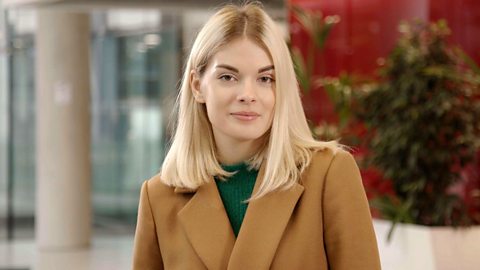Curious onlookers enjoying an idyllic British seaside day out grow horrified, as Hugh Fearnley-Whittingstall directs a truck up to the beachfront, and proceeds to dump kilos of plastic into the water.
тEvery single minute of every single day, a truck-load of plastics is finding its way into the world's oceans,т he shouts over the waterfall of waste pouring out of the truck.
тBut these truckfuls will not be adding to the problem,т Hugh reassures us, as the camera pans out out to reveal that the rubbish is going into a container over the beach. However, plastic waste is causing destruction all over the world, and most of it starts at home.
Three-part series War on Plastic with Hugh and Anita Rani explores the sources of the plastic problem, and looks at what we can all do to try and solve it. Hereтs what we learnt just from episode one.
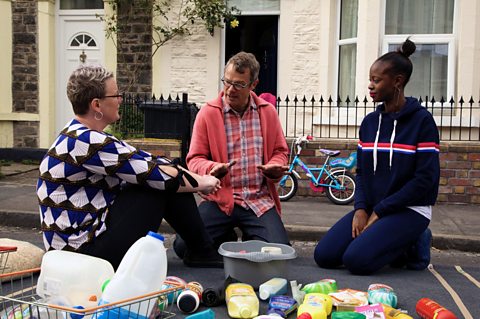
1. Single-use plastic needs to go (but not in the bin)
Plastic itself isnтt so much the problem, if we use it over and over again. But we often use a material that lasts for centuries just once, usually in the packaging of toiletries and food.
Itтs these single-use plastics that are generally not recycled, so itтs better to avoid buying them at all.
Anita takes the first step in fighting the war on plastic by starting on home turf.
In a street in Bristol, Hugh and Anita encouraged 22 houses to add up all their household single-use items.
If the 15,774 plastic items they gathered are representative of every street in Britain, that means there are 19,500 billion plastic items up and down the country - and the number is expected to triple by 2025, unless we reduce our household plastic intake.
Bristol resident Kay says reducing plastic is going to be a hard sell when it comes to changing her cheese. Will she change her mind?
2. Supermarkets should be leading the chain
The Bristol residents could go plastic-free at some local alternatives when doing their food shop, but the cost of switching daily was very high.
Anita set out to see if loose products in the supermarket were the answer. Surprisingly, the ingredients of a standard spag-bol recipe from the packaged shop was ТЃ8.77 compared to ТЃ13.03 - and some of the loose products from the deli counters were still cut and wrapped in plastic.
The residents organised a тhand it backт protest, buying a food shop each and then leaving the plastic in-store. 90% of their items came in plastic packaging - and not all of it was recyclable, meaning a weekly shop creates a lot of waste.
3. We might be sorting our rubbish - but not correctly
47% of people admit to arguing about what is and isnтt recyclable at home. Perhaps thatтs why less than half of all the plastics we produce in this country actually end up in the correct bin.
The confusion was laid bare when Hugh set up a street-side recycling game, and it quickly became clear that not many participants really knew which bin to use. As the rules vary council to council across the country, itтs a wonder any of it makes it to the right place at all.
4. Malaysia is the UKтs new dumping ground
Hugh then experienced first-hand the devastating effect of illegal dumping. Since China stopped accepting rubbish from around the world, Malaysia has become one of the biggest importers of British waste plastics. However, not all of our exports are processed properly - or legally.
тLook at all these tiny, tiny particles of plastics here,т Hugh says, holding up a handful of plastic debris. тAnd that's the kind of stuff that can get into the water course.т
But polluted water is not the only only problem the dumping sites cause. After talking to ambassadors from Malaysian Green Peace later in the episode, Hugh discovered the shocking reality of how these dumps are dealt with - and the toxic effects it has on local families.
5. Itтs time to bottle it on the plastic
While plastic is polluting the water offshore, itтs generating ТЃ2 billion a year in the UK when bottled. To dismiss the hype of water, Hugh adopted a hipster disguise to flog 'Tapineau', the newest smart water sold in reusable bottles to help reduce plastic - and it was taken straight from the tap.
Bottled water actually costs 500 times more to produce. Thatтs the equivalent of paying ТЃ2000-2500 for a pint.
Bottled water is also convenient on the road - so convenient you might not think to look for a refill station. Most petrol stations will offer free refills of tap water if you ask politely, but Hugh found that there was very little signage or encouragement to do so.
He asked one cashier how often people asked to fill their own bottles. The answer was 1-2 times a week, compared to 50-60 plastic bottles sold within that time.
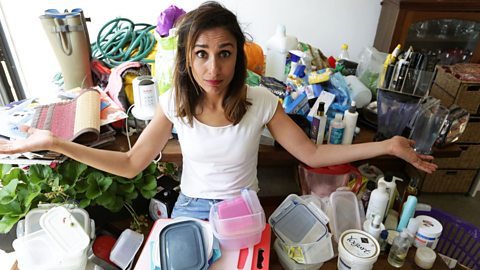 Image source, ТщЖЙдМХФ/Keo Films/Tom Beard
Image source, ТщЖЙдМХФ/Keo Films/Tom BeardThe battle to reduce plastic might seem overwhelming, but thereтs plenty we can do to help win the war. You can watch War On Plastic on ТщЖЙдМХФ iPlayer and catch the next episode on ТщЖЙдМХФ One 9pm Monday.
This article was published in June 2019
Four things we learned from Earth in Space
Those amazing aerial views have something to teach us.
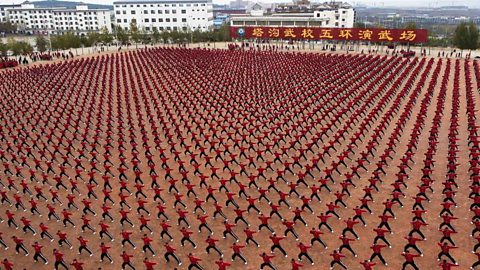
Sustainability and plastics
KS2 Geography
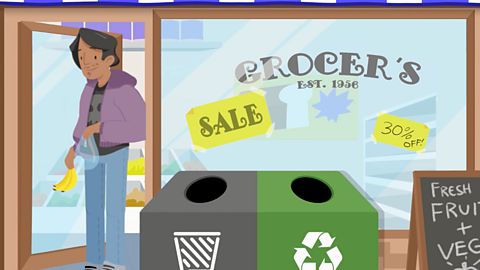
Four jobs that could save the planet
The stories of four people who do their bit for our ecological future every time they clock in for a shift.
